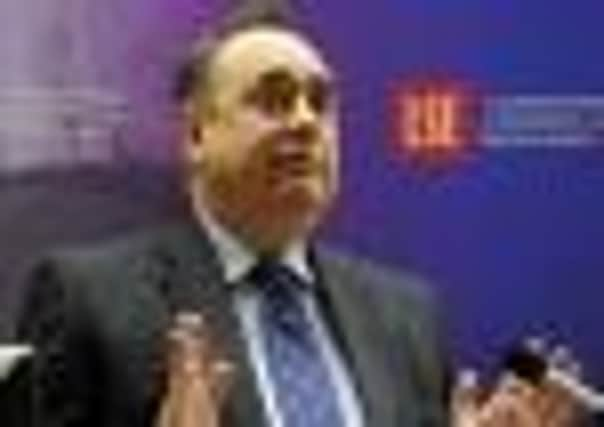Scottish independence: Alex Salmond’s Nato and nukes dilemma


As the SNP debates a U-turn that could see Alex Salmond’s party dropping its long-standing opposition to being a member of the international defence pact, Professor Malcolm Chalmers has claimed that signing up to the organisation would mean the Trident submarine fleet and its nuclear warheads being kept in Scotland for possibly decades to come.
In a paper commissioned by Scotland on Sunday, Chalmers, the defence policy director of the Royal United Services Institute, stated that the SNP’s anti-nuclear stance would be “hard to square” with an independent Scotland accepting Nato’s commitment to a nuclear alliance. A separate Scottish government might have to allow the UK’s nuclear deterrent to remain based in Scotland if it wanted to remain within the military group.
Advertisement
Hide AdAdvertisement
Hide AdChalmers’ analysis suggests the SNP government now has a difficult choice to make in the run-up to the independence referendum planned for 2014 as leaving Nato would be unpopular with many grassroots members.


A recently-published survey exposed deep fault lines in the party when it found that more than half of the membership opposed the long-held view that an independent Scotland should withdraw from Nato.
The policy’s unpopularity with members and the public at large has now led to the SNP preparing to rethink its Nato position. The SNP defence spokesman Angus Robertson has said the party is “looking at the policy options” on the Nato treaty.
In his paper, Chalmers also warned that, after independence, Scotland would struggle to fly combat aircraft, could not afford new frigates and submarines and would see lucrative defence contracts move to England.
With a defence budget of around £2 billion, Chalmers cautioned that with just one new aircraft costing around £100 million, an independent Scotland could be forced to stop flying combat planes. He also questioned whether a separate UK would retain a “foreign” airbase in Scotland.
His analysis, which is published today on the Scotland on Sunday website, also said that an independent Scotland could not afford to maintain any of the seven Astute class nuclear-powered submarines that are supposed to come into service at Faslane over the next decade.
He argued that it would “not make sense” for Scotland to acquire any of the new Type 26 frigates due to enter service in the 2020s, most of which are scheduled to be built on the Clyde – resulting in job losses.
On the central issue of Nato, Chalmers highlighted other political dangers should Scotland choose to leave the organisation. He said the existing SNP policy of withdrawal would be faced with “hostile” US opinion and would make it difficult for Scotland to maintain relations and technical co-operation with the UK armed forces.
Advertisement
Hide AdAdvertisement
Hide AdIn his paper, Defence In An Independent Scotland, he also claimed that withdrawal would result in neighbouring Nato countries becoming wary of Scottish attempts to “free-ride” on their security protection.
Chalmers believes that signing up to Nato would create its own problems for a party that has always opposed nuclear weapons. He wrote: “There would be a fundamental inconsistency in accepting the role of nuclear weapons in Nato’s security, but demanding their rapid removal from one’s own national territory.”
According to Chalmers, Scotland would be under pressure to delay the removal of Trident until agreement could be reached with the UK. Chalmers gave the examples of Ireland, which saw Royal Navy ships in Irish ports for 17 years after independence in the 1920s, and the Russian fleet which will be stationed in Sevastopol until 2042, even though the Ukraine gained independence in 1991.
“Recent historical precedent suggests that they [nuclear weapons] could remain for some considerable period of time, likely to be measured in decades rather than years,” Chalmers wrote.
He warned it will be “much more difficult or perhaps politically impossible” to find another place to store the nuclear warheads currently stationed at Coulport.
Last night, the SNP said its long-standing policy was for Scotland to be a member of the Partnership for Peace – like Sweden, Austria, Finland and Ireland – which provides for defence co-operation between Nato and non-Nato countries.
Robertson said: “An independent Scotland will not have unwanted, unneeded and hugely expensive Trident nuclear weapons based in Scottish waters. We will be able to decide Scotland’s own defence priorities.”
Last night, Labour’s shadow defence secretary, Jim Murphy MP, said: “This is a devastating critique of the SNP’s position on defence. Scots deserve to know how big our armed forces would be, how would the shipyards stay open, how many navy ships Scotland would have, what happens to the RAF, our membership of Nato and our role on the UN Security Council – before the referendum, not after.”